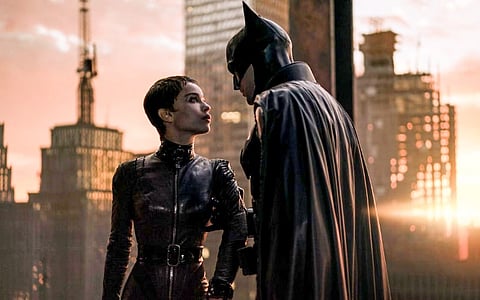
- Reviews
- Power List 2024
- Cannes 2024
- In-Depth Stories
- Web Stories
- News
- FC Lists
- Interviews
- Features
- FC SpecialsFC Specials

You would think that with a runtime which even Bollywood doesn't do anymore, there would be some point in The Batman where you'd sneak a glance at the time on your phone and think to yourself, "still seventy minutes to go"? But that time doesn't come.
In a world inundated with formulaic Marvel movies full of cringey sentimentality and cheesy quips, this film is beautifully dark, grimy, and solemn the whole way through. You can watch it without doing the homework of memorising lengthy backstories and the chain of events. It goes back to the core of who Batman is: a detective, a brooding rich billionaire who could do far more to help his city with his money than he is by dressing up as a bat and beating up criminals, and someone with an incredible moral consciousness. Each aspect is wonderfully played up to create a film that is both a kind of thriller/mystery as well as a political commentary, with more depth than you would expect from a superhero film.
The threat to Gotham City gets grander, as Robert Pattinson's achingly broody Batman tries to solve the Riddler's clues to stop him from murdering powerful and eminent politicians and policemen. But there is no super powerful, super evil villain. There are only ordinary people who take bribes, who are corrupt, who hurt and kill their opponents for their own gain – ordinary people like us, who have crossed the blurry line between good and bad. This makes the villain more real and scarier. Batman believes he has not crossed this line, until he finds out he and his family may not be as innocent as he thinks they are.
In a movie where several key characters, Catwoman (Zoë Kravitz), James Gordon (Jeffrey Wright), and mayoral candidate Bella Real (Jayme Lawson) are people of colour, The Batman manages to save itself from falling into the white saviour trope by forcing Batman to examine the privilege that has come from being a rich white male. He is an orphan like the Riddler, but unlike the Riddler, he has lived in a mansion with Alfred, and with enormous wealth his entire life. The film ends with Batman's realisation that vengeance is not enough; he needs to listen, he needs to help those who no one else helps, and he needs to inspire hope, not revenge. With a lesser writer and director the film would have become sentimental at this point, but writer Peter Craig, and writer and director Matt Reeves manage to pull off the ending smoothly and make relevant sociopolitical points.
One of my favourite scenes in the film is the Batmobile chase; the visuals of a black Batmobile flying out of a fiery explosion are awesome. At the end of the chase, the person he was chasing watches from the side view mirror of his crashed, upside-down car, as Batman slowly walks towards him, his cape flapping in the wind against orange and yellow. Gotham City, or really, New York City, where I have lived for years, looks stunning against Reeves' perpetual dusky blue sky. For hours after I came home, I looked down from the window of my apartment and felt like I was still in the world where the Bat signal could suddenly appear in the sky. The thrilling soundtrack kept playing in my head as well.
Pattinson didn't stick out to ardent Batman fans as the right choice at first, but with a few wisps of hair always strewn across his face, with what seems to be smudged eyeliner under his eyes but is never addressed, and with a body that somehow is somehow muscular but also looks like he hasn't properly eaten in days, Pattinson is perfect for the role. He doesn't have the charm of the other Batmans either, just a perpetual angst that doesn't stop at his eyes, but seems to radiate from his soul. Kravitz's Catwoman is great because she isn't around to be the hero's love interest or help him with his mission; instead, she has her own engaging storyline which brilliantly connects to the central one. Instead of being sexy, she is a sex worker who uses her looks to manipulate the men around her. And with her top-notch action she doesn't hang off buildings waiting for Batman to save her, but once even saves him.